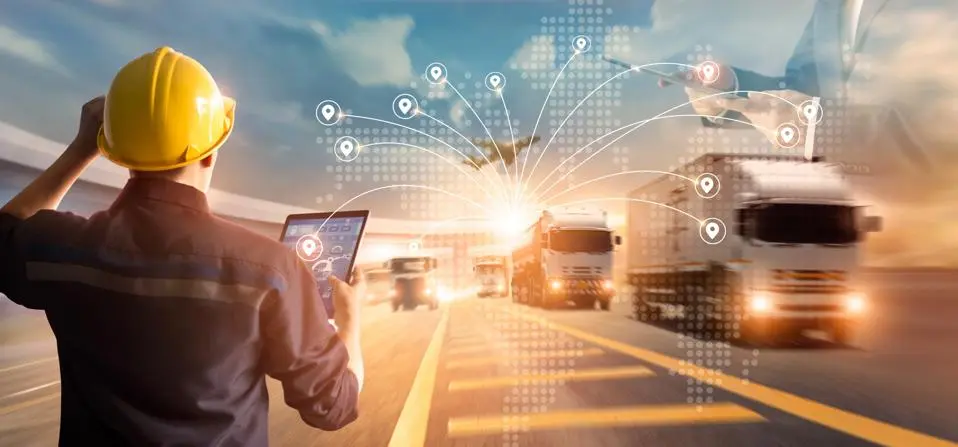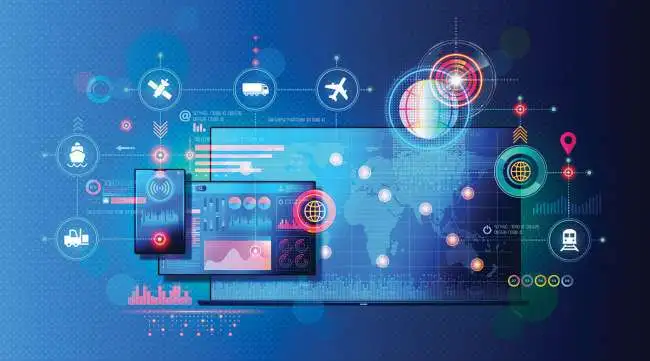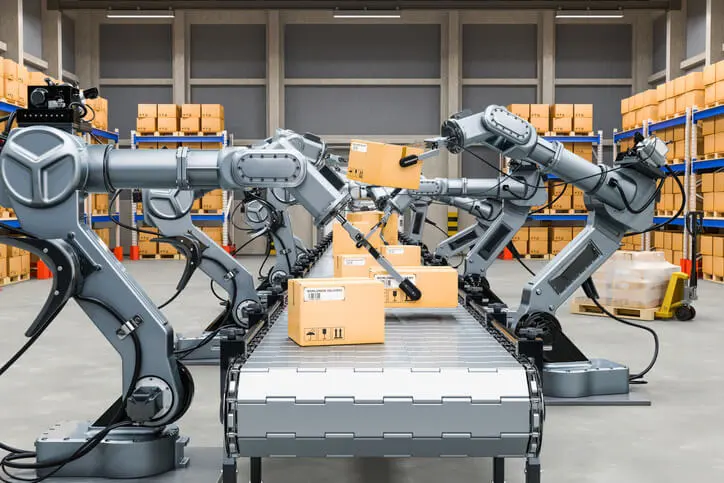How Is AI Transforming the Logistics Industry? One of the most remarkable impacts of AI in logistics is its ability to enhance route optimization. Traditional logistics relied heavily on predefined routes and schedules, often leading to inefficiencies and delays. With AI, logistics companies can analyze vast amounts of data in real-time — from weather patterns to traffic updates — to chart the most efficient routes possible. It’s like having a super-intelligent navigator that adjusts dynamically to ensure deliveries are made swiftly and cost-effectively. How Is AI Transforming the Logistics Industry?
Moreover, AI is enabling predictive analytics in logistics. By crunching historical data and current trends, AI algorithms can forecast demand patterns with unprecedented accuracy. This means warehouses can stock inventory more intelligently, anticipating what customers will need even before they place an order. It’s akin to having a crystal ball that helps businesses stay ahead of the curve, minimizing stockouts and reducing storage costs.
AI-powered automation is another game-changer in logistics. Tasks that once required hours of manpower can now be completed in minutes, thanks to robotic process automation (RPA) and AI-driven robotics. From sorting packages to loading trucks, these robots work tirelessly with precision, freeing up human workers for more complex and strategic tasks.
Customer experience has also seen a significant boost with AI in logistics. Chatbots powered by natural language processing (NLP) can handle customer queries instantly and accurately, providing 24/7 support. AI algorithms also personalize the delivery experience, offering customers flexible delivery options based on their preferences and behavior.

AI’s Impact on Logistics: Efficiency Soars as Automation Takes Over
Imagine a world where logistics isn’t just about moving goods from point A to point B, but a seamless dance of efficiency and precision. Thanks to Artificial Intelligence (AI), this vision is quickly becoming a reality. AI’s integration into logistics processes is revolutionizing how businesses manage their supply chains, optimize routes, and deliver products faster than ever before.
One of the most striking impacts of AI in logistics is its ability to enhance efficiency. Traditionally, logistics involved complex planning and manual execution, prone to errors and delays. Now, with AI-powered systems, tasks like route planning, warehouse management, and inventory forecasting are streamlined with incredible accuracy. This means fewer delays, reduced costs, and happier customers receiving their orders on time.
Think of AI as the conductor of a symphony orchestra, ensuring every instrument plays in harmony to produce a flawless performance. Similarly, AI coordinates various elements of logistics—like transportation modes, delivery schedules, and inventory levels—to orchestrate a smooth operation. This orchestration not only saves time and money but also minimizes environmental impact by optimizing fuel consumption and reducing carbon emissions.
Moreover, AI’s predictive capabilities are a game-changer for logistics. By analyzing historical data and real-time information, AI algorithms can forecast demand patterns, anticipate potential disruptions, and proactively adjust logistics strategies. This foresight enables businesses to stay ahead in a fast-paced market, responding swiftly to changes and maintaining a competitive edge.
Automation, a cornerstone of AI technology, plays a pivotal role in transforming logistics. Tasks that once required human intervention, such as order processing and sorting, are now handled autonomously by AI-driven robots and smart machines. This shift not only frees up human resources for more strategic roles but also minimizes errors and enhances overall operational efficiency.
AI’s integration into logistics brings unparalleled opportunities for efficiency and innovation. By harnessing the power of AI, businesses can optimize their supply chains, reduce costs, and deliver superior customer experiences. As we embrace this era of automation and intelligence, the logistics landscape is poised for remarkable advancements that will shape the future of commerce and industry.

From Warehouses to Roads: AI’s Role in Revolutionizing Logistics
AI’s role in logistics is akin to having a supercharged navigator in every truck and warehouse. Imagine AI algorithms analyzing traffic patterns in real-time, rerouting vehicles to avoid delays, and optimizing delivery schedules dynamically. This isn’t just about efficiency; it’s about reshaping the entire supply chain ecosystem.
One of the most significant impacts of AI in logistics is predictive analytics. By crunching vast amounts of data – from historical delivery times to weather forecasts – AI can predict potential delays and optimize routes accordingly. This predictive capability doesn’t just save time and money; it ensures that goods arrive when they’re expected, fostering customer satisfaction and loyalty.
In warehouses, AI-driven robots are transforming inventory management and order fulfillment. These robots can swiftly pick and pack items, significantly reducing human labor and errors. With AI’s ability to learn from data and adapt to new situations, warehouse operations are becoming more efficient and responsive to changing demands.
Furthermore, AI enhances supply chain visibility by providing real-time insights into inventory levels, shipment statuses, and demand forecasts. This visibility allows logistics companies to streamline operations, minimize waste, and respond swiftly to market fluctuations.
The AI revolution in logistics isn’t just about technology; it’s about reimagining how goods move from point A to point B. It’s about harnessing the power of data and algorithms to create a smarter, more efficient supply chain that benefits businesses and consumers alike. As AI continues to evolve, so too will its impact on logistics, shaping a future where efficiency, speed, and sustainability go hand in hand. How Is AI Transforming the Logistics Industry?

Navigating the Future: AI’s Disruption of Traditional Logistics Practices
In the realm of logistics, efficiency is king. AI brings a new level of efficiency by optimizing routes, predicting demand patterns, and even automating routine tasks. Picture this: AI algorithms analyzing real-time traffic data to reroute delivery trucks dynamically, minimizing delays and reducing fuel consumption. It’s like having a supercharged GPS that not only guides you but also learns from traffic patterns to get you there faster and smarter.
But AI isn’t just about optimizing routes. It’s also about predicting the unpredictable. Traditional logistics often struggle with demand forecasting, leading to either excess inventory or stockouts. AI changes the game by crunching vast amounts of data—from historical sales figures to weather forecasts and social media trends—to predict future demand with uncanny accuracy. It’s like having a crystal ball that helps businesses stock just the right amount, at the right place, and at the right time.
Moreover, AI enhances decision-making processes. Imagine a logistics manager faced with a sudden disruption—a port strike or a natural disaster. AI-powered systems can instantly assess alternatives, crunching data on available options and recommending the best course of action. It’s akin to having a seasoned advisor who can process immense amounts of information in seconds and provide actionable insights.
On the operational front, AI-driven automation is transforming warehouses and distribution centers. Robots equipped with AI navigate aisles, pick items, and pack orders with precision. This not only speeds up operations but also reduces errors and labor costs. It’s like having a tireless workforce that works 24/7 without breaks or errors, ensuring orders are fulfilled accurately and swiftly.
In essence, AI’s disruption of traditional logistics practices isn’t just a trend—it’s a fundamental shift towards smarter, more responsive, and efficient supply chains. Embracing AI isn’t just about keeping up with the competition; it’s about staying ahead of the curve in a world where speed, accuracy, and agility define success. The future of logistics is here, driven by AI, and those who navigate this transformative wave will emerge stronger and more resilient in the evolving global marketplace. How Is AI Transforming the Logistics Industry?
Supply Chain 2.0: AI’s Crucial Role in Streamlining Logistics Operations
AI’s role in Supply Chain 2.0 is nothing short of revolutionary. It’s like having a crystal ball that peers into the future of logistics operations. By analyzing vast amounts of data in real-time, AI can forecast demand more accurately than any human ever could. This means fewer overstocked warehouses and fewer empty shelves. It’s all about keeping things balanced and efficient.
But that’s not all. AI’s ability to streamline logistics operations extends to optimizing delivery routes. Think of it as your personal GPS but on steroids. Instead of relying on outdated maps and guesswork, AI crunches traffic data, weather reports, and historical patterns to find the quickest, most cost-effective routes. This not only saves time but also reduces fuel consumption and emissions, making your logistics operations greener.
In the realm of inventory management, AI is a game-changer. It helps businesses predict which products will be in demand and adjust stock levels accordingly. Imagine trying to juggle a hundred balls in the air—AI acts as a skilled juggler, ensuring nothing falls and everything lands exactly where it should.
Moreover, AI enhances supply chain visibility, providing real-time updates on the status of shipments and potential disruptions. It’s like having a live feed of your supply chain’s heartbeat, allowing for quick, informed decisions that keep everything running smoothly.
With AI at the helm, logistics operations are becoming more agile, efficient, and adaptable, turning the chaotic city of supply chains into a streamlined, well-coordinated metropolis. How Is AI Transforming the Logistics Industry?
Beyond Human Limits: How AI Enhances Accuracy and Speed in Logistics
One of the most striking benefits of AI in logistics is its ability to enhance accuracy to levels that surpass human capability. Traditional logistics operations often grapple with human errors, such as incorrect data entry or miscommunication. These seemingly small mistakes can ripple through the entire supply chain, causing delays and added costs. AI steps in with its unmatched ability to process vast amounts of data with lightning speed and near-perfect accuracy. By automating routine tasks like inventory management and predictive analytics, AI minimizes errors and maximizes efficiency, ultimately saving both time and resources.
Speed is another area where AI shines brightly in logistics. In today’s fast-paced world, the speed of delivery can often be the deciding factor for customer satisfaction. AI algorithms are adept at analyzing real-time data to optimize delivery routes, predict demand fluctuations, and even anticipate potential disruptions like traffic or weather conditions. This predictive capability allows logistics companies to proactively adjust their operations, ensuring that goods reach their destination swiftly and smoothly.
Consider a scenario where an AI-powered logistics company receives an order from a customer. From the moment the order is placed, AI systems kick into action, swiftly processing the order details, checking inventory levels across multiple warehouses in seconds, and identifying the optimal route for delivery based on current traffic conditions. Meanwhile, human intervention is minimized to overseeing and fine-tuning the process, ensuring that every step aligns with the company’s service standards.
In essence, AI doesn’t replace humans in logistics; it enhances their capabilities, allowing them to focus on higher-value tasks that require creativity and strategic thinking. By taking over repetitive and data-intensive tasks, AI liberates human workers to innovate and improve customer experiences. This symbiotic relationship between AI and human expertise is transforming the logistics industry, pushing it beyond previous limits and setting new benchmarks for efficiency and reliability. As technology continues to evolve, the future of logistics powered by AI promises even greater feats, where the once unimaginable becomes the new norm.
AI Algorithms Unveiled: Predictive Analytics Reshaping Logistics Strategies
Ever wondered how logistics companies manage to deliver your package right on time, every time? Behind the scenes, artificial intelligence (AI) algorithms are quietly revolutionizing the way logistics strategies are crafted and executed. From warehouses to transportation routes, predictive analytics powered by AI is the secret sauce that ensures efficiency and reliability.
Imagine this: AI algorithms are like highly skilled chess players, constantly analyzing past moves (data) to predict the next best move (logistics decision). They sift through mountains of historical data on everything from shipping routes to seasonal trends in demand. This data treasure trove allows AI to forecast potential disruptions before they occur, enabling logistics companies to proactively adjust their strategies. It’s like having a crystal ball that helps you foresee challenges and optimize operations in real-time.
Take the example of a global shipping company. By harnessing predictive analytics, they can anticipate spikes in demand during holiday seasons or detect weather patterns that might affect delivery times. This foresight allows them to reroute shipments dynamically, ensuring that packages reach their destinations without delays.
Moreover, AI doesn’t just stop at predicting disruptions. These algorithms are also masters at optimizing logistics networks. They can crunch numbers faster than any human could ever dream of, finding the most cost-effective routes or the optimal placement of inventory across warehouses. This efficiency not only saves time and money but also reduces carbon footprints by minimizing unnecessary transportation.
In essence, AI algorithms are the silent heroes of modern logistics. They work tirelessly behind the scenes, leveraging predictive analytics to streamline operations and enhance customer satisfaction. As technology advances, these algorithms will only become more sophisticated, paving the way for a future where logistics is not just about moving goods from point A to point B, but about doing so with unmatched precision and efficiency.
Smart Logistics: How AI is Redefining Delivery Networks
In today’s fast-paced world, efficiency is key. AI-powered logistics systems are revolutionizing how goods move from point A to point B. These systems harness vast amounts of data to optimize routes, predict demand fluctuations, and streamline operations. Picture AI as the conductor of a symphony orchestra, harmonizing multiple factors seamlessly to orchestrate flawless delivery performances.
One of the standout features of AI in logistics is its ability to learn and adapt. Similar to how we learn from experience, AI algorithms continuously improve by analyzing past delivery data. This enables them to make smarter decisions in real-time, such as rerouting a delivery vehicle to avoid traffic or prioritizing urgent shipments. It’s like having a seasoned navigator who always finds the quickest route, no matter the obstacles.
Moreover, AI enhances transparency in logistics. Customers can track their packages in real-time, receiving updates at every stage of the journey. This level of visibility builds trust and satisfaction, ensuring that deliveries are not just timely but also predictable. Imagine knowing exactly where your package is at any moment, much like tracking a friend’s road trip on a map.
Another exciting aspect is AI’s role in sustainability. By optimizing delivery routes and vehicle loads, AI helps reduce fuel consumption and carbon emissions. It’s akin to planting trees along a highway to absorb CO2 emissions—a small action with significant environmental benefits.


